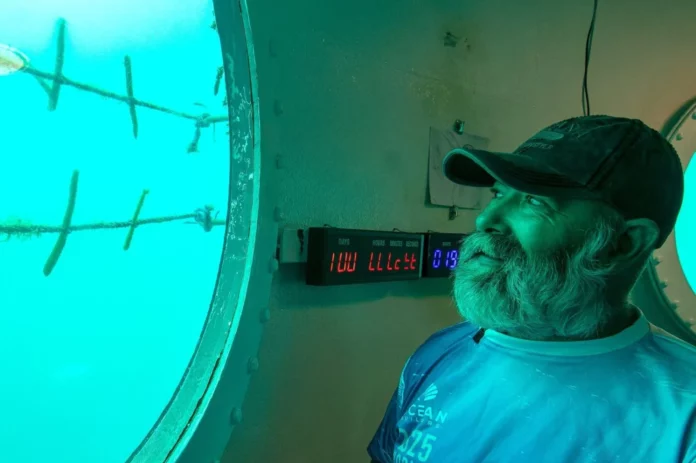An aerospace engineer has just spent 120 days not in the air, not in space, but underwater.
On Friday, Rudiger Koch completed his 120th day in a capsule submerged in the Caribbean Sea, setting an official Guinness World Record for the longest time underwater without depressurization. His goal was to prove that the oceans are a possible habitat for the future expansion of humanity, AFP reports.
“It was a great adventure and now that it’s over, I almost regret it. I had a really good time here,” the 59-year-old German man told AFP. “It’s beautiful when everything calms down, it gets dark and the sea glows.” He celebrated his victory with champagne, a cigar and a swim.
Koch spent about four months in a 322.9-square-foot (30-square-meter) capsule 36 feet (11 meters) below the water’s surface off the coast of Panama. Built by Ocean Builders – a company co-founded by Koch that works on sustainable ocean living – the capsule had a bed, toilet, internet, electricity, TV and exercise bike. However, it had no shower (which makes his celebratory dive on Friday all the more understandable) and limited access to fresh water.
“It was like waking up from a dream. I’m in a magical dreamland,” he said, according to The Times.
The underwater capsule was connected to the surface capsule by a pipe with a spiral staircase. However, the stairs were only for visitors such as the doctor, family, and friends who brought food. In fact, the capsule was equipped with four cameras to make sure Koch never emerged, according to AFP.
“We needed witnesses who watched and checked 24/7 for more than 120 days,” Susana Reyes, a Guinness World Record judge who confirmed the new world record, told AFP. “The previous record was set by Joseph Dituri, an American who lived in an underwater house in Florida, USA. The previous record holder was Joseph Dituri, an American who lived in an underwater house in Florida for 100 days.
The purpose of Koch’s stay underwater was to demonstrate the potential for sustainable human aquatic expansion.
“Going out to sea is something we should do, it would actually contribute to the restoration of things like reefs,” he said in an interview with CBS two months after the adventure, though he did not explain how Ocean Builder pods could contribute to this environmental vision.
“Our technology will allow civilization to go out to sea and open up the ocean as a new frontier with an unparalleled quality of life,” the Ocean Builder website says. “We believe that by learning to live on the water, we will unleash a new wave of sustainable innovations that will lead to more sustainable living on land.”
It remains to be seen how and if this experience has affected Koch’s health – and who else might be interested in living 36 feet underwater in the future.









